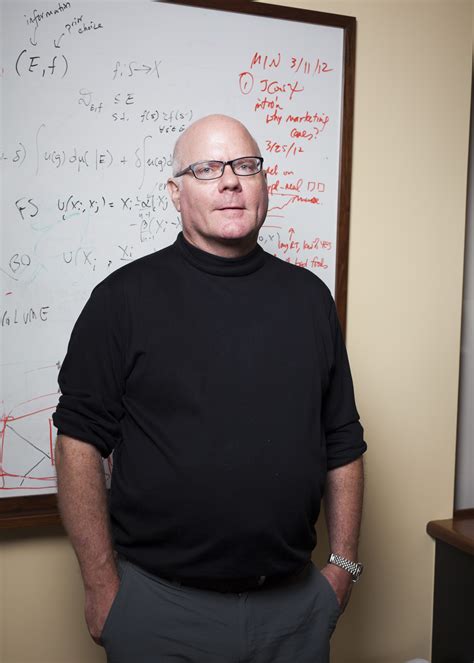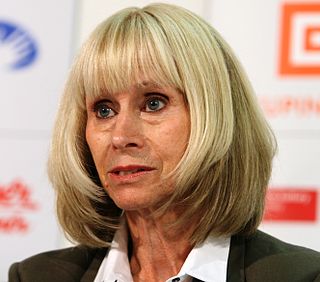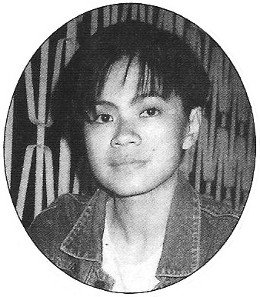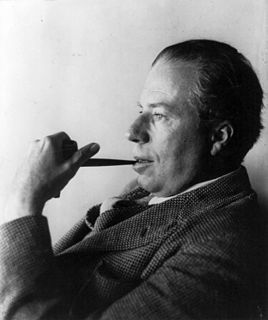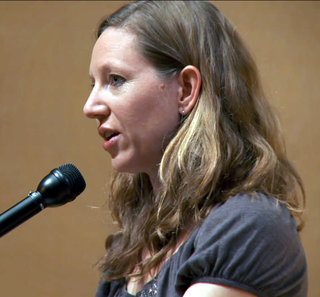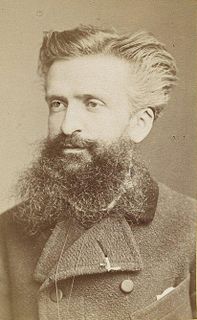Top 1200 Relation Quotes & Sayings - Page 20
Explore popular Relation quotes.
Last updated on April 21, 2025.
A man should not go where he cannot carry his whole sphere or society with him,Mnot bodily, the whole circle of his friends, but atmospherically. He should preserve in a new company the same attitude of mind and reality of relation, which his daily associates draw him to, else he is shorn of his best beams, and will be an orphan in the merriest club.
The ordinary naturalist is not sufficiently aware that when dogmatizing on what species are, he is grappling with the whole question of the organic world & its connection with the time past & with Man; that it involves the question of Man & his relation to the brutes, of instinct, intelligence & reason, of Creation, transmutation & progressive improvement or development. Each set of geological questions & of ethnological & zool. & botan. are parts of the great problem which is always assuming a new aspect.
This act [creation], as it is for God, must always remain totally inconceivable to man. For we--even our poets and musicians and inventors--never, in the ultimate sense make. We only build. We always have materials to build from. All we can know about the act of creation must be derived from what we can gather about the relation of the creatures to their Creator
It's definitely a unique situation that we're in. And, yeah, it is difficult not having our ringleader here with us to talk about the film [the Waitress], not having our main person here. People are also asking in relation to the film: what would Adrienne [ Shelly] say about this or that? But I don't know. I don't know what she would say.
We may treat of the Soul as in the body - whether it be set above it or actually within it - since the association of the two constitutes the one thing called the living organism, the Animate.Now from this relation, from the Soul using the body as an instrument, it does not follow that the Soul must share the body's experiences: a man does not himself feel all the experiences of the tools with which he is working.
In the days of witchcraft it used to be believed that if one person secretly made a waxen image of another and stuck pins into the image, its counterpart would suffer tortures, and that if the image was melted the person would die. This superstition is almost realized in the relation between the private self and its social reflection. They seem to separate but are darkly united, and what is done to the one is done to the other.
Charles Darwin and I and you broke off from the family tree from chimpanzees about five million years ago. They're still our closest genetic kin. We share 98.8 percent of the genes. We share more genes with them than zebras do with horses. And we're also their closest cousin. They have more genetic relation to us than to gorillas.
True religion is not talk, or doctrines, or theories, nor is it sectarianism. It is the relation between soul and God. Religion does not consist in erecting temples, or building churches, or attending public worship. It is not to be found in books, or in words, or in lectures, or in organizations. Religion consists in realization. We must realize God, feel God, see God, talk to God. That is religion.
Perhaps it is not-being that is the true state, and all our dream of life is inexistent; but, if so, we feel that these phrases of music, these conceptions which exist in relation to our dream, must be nothing either. We shall perish, but we have as hostages these divine captives who will follow and share our fate. And death in their company is somehow less bitter, less inglorious, perhaps even less probable.
Men look at women. Women watch themselves being looked at. This determines not only most relations between men and women but also the relation of women to themselves. The surveyor of woman in herself is male: the surveyed female. Thus she turns herself into an object - and most particularly an object of vision: a sight.
I was keen to dispel a familiar misunderstanding: that existentialists somehow relish the alienation of human beings from the world. This may have been Camus's attitude, but it was certainly not that of Heidegger, Sartre and Merleau-Ponty, each of whom tried to show that we can only experience the world in relation to our own projects and purposes. The world is initially one of 'equipment', said Heidegger: it is a world of 'tasks', said Sartre.
The indifference, callousness and contempt that so many people exhibit toward animals is evil first because it results in great suffering in animals, and second because it results in an incalculably great impoverishment of the human spirit. All education should be directed toward the refinement of the individual's sensibilities in relation not only to one's fellow humans everywhere, but to all things whatsoever.
Memoir is trustworthy and its truth assured when it seeks the relation of self to time, the piecing of the shards of personal experience into the starscape of history's night. The materials of memoir are humble, fugitive, a cottage knitting industry seeking narrative truth across the crevasse of time as autobiography folds itself into the vast, fluid essay that is history. A single voice singing its aria in a corner of the crowded world.
Perhaps no man is an island, but every man and woman is a nation unto herself. I actually had to look up the definition of "nation"; this is how awkward my relation is to this concept. And it is defined as, "a large aggregate of people united by common descent, history, culture, or language, inhabiting a particular country or territory." Perhaps if you replace "descent" with "dissent" the definition becomes more meaningful.
My problem with Obama is that he's not a new paradigm; he's an old paradigm. A new paradigm would be somebody like Harold Ford [former Democratic Congressman from Tennessee] or Michael Steele [former Republican Lieutenant Governor of Maryland], no relation, both of whom present themselves as individuals, and don't seem to wear a mask. They don't 'bargain;' they don't 'challenge.' So, I see them as fresh, and as evidence of what I hope will be a new trend.
Vanity, fear, desire, competition - all such distortions within our own egos - condition our vision of those in relation to us. Add to those distortions to our own egos the corresponding distortions in the egos of others, and you see how cloudy the glass must become through which we look at each other.
Let us hope that the advent of a successful flying machine, now only dimly foreseen and nevertheless thought to be possible, will bring nothing but good into the world; that it shall abridge distance, make all parts of the globe accessible, bring men into closer relation with each other, advance civilization, and hasten the promised era in which there shall be nothing but peace and goodwill among all men.
Sex itself only only exists in relation to procreation. That's one of the reasons why I sometimes object, and it's just a theoretical objection, but it's worth thinking about, to the whole notion that one calls what people of the same sex do, sexual relations. As a matter of fact, they have precisely turned their back on sexual relations, in order to engage in acts of mutual pleasure that have nothing whatsoever to do with sexuality...
All women should inform themselves of the condition of their sex and of their own position. It must necessarily follow that the noblest of them will, sooner or later, put forth a moral power which shall prostrate cant, and burst asunder the bonds (silken to some but cold iron to others) of feudal prejudice and usages. In the meantime is it to be understood that the principles of the Declaration of Independence bear no relation to half of the human race? If so, what is the ground of this limitation?
I must make MAGICK the essential factor in the life of ALL. In presenting this book to the world, I must then explain and justify my position by formulating a definition of MAGICK and setting forth its main principles in such a way that ALL may understand instantly that their souls, their lives, in every relation with every other human being and every circumstance, depend upon MAGICK and the right comprehension and right application thereof.
Above all, documentary must reflect the problems and realities of the present. It cannot regret the past; it is dangerous to prophesy the future. It can, and does, draw on the past in its use of existing heritages but it only does so to give point to a modern argument. In no sense is documentary a historical reconstruction and attempts to make it so are destined to failure. Rather it is contemporary fact and event expressed in relation to human associations.
Human nature has its fatal weaknesses, but 'love' means embracing the whole of human nature, the bad within the good, the benign within the malicious, the beautiful within the tragic. 'Love' is the experience of this whole, its unfinished parts, including those of one's own in relation to those of the other.
Truth and Beauty (perhaps Keats was wrong in identifying them: perhaps they have the relation of Wit and Humour, or Rain and Rainbow) are of interest only to hungry people. There are several kinds of hunger. If Socrates, Spinoza, and Santayana had had free access to a midnight icebox we would never have heard of them. Shall I be ashamed of my little mewing truths?... I ask to be forgiven: they are such tiny ones.
Relationships are never about power, and one way to avoid the will to hold power over another is to chose to limit to onself - to serve. Humans often do this - in touching the infirm and sick, in serving the ones whos minds have left to wander, in relation to the poor, in loving the very old and the very young, or even in caring for the others who has assumed a position of power over them.
I am thinking of actual cases of adolescents, lets say, who think they have five hundred friends, because there are five hundred people on their Facebook account. But these are the kind of friends whose relation to you is that if you say 'I bought a sandwich'; they say 'did it taste good?' You know, that's a kind of interaction, but very different to having a real friend, somebody who you can actually talk to.
The intimate relation between humor and faith is derived from the fact that both deal with the incongruities of our existence. Laughter is our reaction to immediate incongruities and those which do not affect us essentially. Faith is the only possible response to the ultimate incongruities of existence, which threaten the very meaning of our life.
I think, about the distinction between fiction and nonfiction. Fiction is not really about anything: it is what it is. But nonfiction - and you see this particularly with something like the BBC Samuel Johnson Prize for Non-Fiction - nonfiction we define in relation to what it's about. So, Stalingrad by Antony Beevor. It's "about" Stalingrad. Or, here's a book by Claire Tomalin: it's "about" Charles Dickens.
Can anything be more disgusting than to hear people called 'educated' making small jokes about eating ham, and showing themselves empty of any real knowledge as to the relation of their own social and religious life to the history of the people they think themselves witty in insulting? [...] The best thing that can be said of it is, that it is a sign of the intellectual narrowness—in plain English, the stupidity which is still the average mark of our culture.
I know who Queen Elizabeth represents. I know she's the head of the British state. I know she has all sorts of titles in relation to different regiments in the British army. She knows my history. She knows I was a member of the IRA. She knows I was in conflict with her soldiers, yet both of us were prepared to rise above all of that.
You know I really don't like to think about the fact that I'm a girl in relation to the music industry. I was just a kid who wrote down thoughts to organize her brain and that turned into music, like any other writer or musician... so, I happen to be a girl. I don't consider that part of it really.. It may disappoint some feminists out there that I don't want to harp on women and men being equal.
The ego is as you think of yourself. You in relation to all the commitments of your life, as you understand them. The self is the whole range of possibilities that you've never even thought of. And you're stuck with you're past when you're stuck with the ego. Because if all you know about yourself is what you found out about yourself, well, that already happened. The self is a whole field of potentialities to come through.
While we destroyed the Centre Party, we have not only brought thousands of priests back into the Church, but to millions of respectable people we have restored their faith in their religion and in their priests. The union of the Evangelical Church in a single Church for the whole Reich, the Concordat with the Catholic Church, these are but milestones on the road which leads to the establishment of a useful relation and a useful co operation between the Reich and the two Confessions.
There are really three players: 'absolutists', for whom it is possible to describe reality as it anyway is; 'constructivists' or 'humanists', for whom there is nothing beyond a world that is relative to human interests and conceptual schemes; and 'ineffabilists', like myself, for whom any describable world indeed exists 'only in relation to man', as Heidegger put it, but for whom, as well, there is an ineffable realm 'beyond the human'.
To know only one thing well is to have a barbaric mind: civilization implies the graceful relation of all varieties of experience to a central humane system of thought. The present age is peculiarly barbaric: introduce, say, a Hebrew scholar to an ichthyologist or an authority on Danish place names and the pair of them would have no single topic in common but the weather or the war (if there happened to be a war in progress, which is usual in this barbaric age).
In brief, I regard love as a more decisive focus of meaning than death. In terms of Heidegger's argument, this is because I think he misdescribes the importance of the deaths of others and focuses exclusively on my relation to my own death. But, in reality, the deaths of others have a more urgent and immediate impact on our lives than the purely notional knowledge that I too will one day die.
Most of the bio men on earth were born to women, so it's pretty ordinary! But I think because I had come from a matriarchy - my father died when I was young, and I only have a sister and a stepsister - when I told my mom and my sister that I was having a boy, they were both like, "That does not compute within our family relation!" It was like, "Girls only here!" Now that all seems very strange to me.
What is a totem? It is as a rule an animal (whether edible and harmless or dangerous and feared) and more rarely a plant or a natural phenomenon (such as rain or water), which stands in a peculiar relation to the whole clan. In the first place, the totem is the common ancestor of the clan; at the same time it is their guardian spirit and helper, which sends them oracles and, if dangerous to others, recognizes and spares its own children.
The social mould civilization fits us into have no more relation to our actual shapes than the conventional shapes of the constellations have to the real star-patterns. I am called Mrs. Richard Phillotson, living a calm wedded life with my counterpart of that name. But I am not really Mrs. Richard Phillotson, but a woman tossed about, all alone, with aberrant passions, and unaccountable antipathies.
England was nothing, compared to continental nations until she had become commercial... until about the middle of the last century, when a number of ingenious and inventive men, without apparent relation to each other, arose in various parts of the kingdom, succeeded in giving an immense impulse to all the branches of the national industry; the result of which has been a harvest of wealth and prosperity, perhaps without a parallel in the history of the world.
That perhaps is your task--to find the relation between things that seem incompatible yet have a mysterious affinity, to absorb every experience that comes your way fearlessly and saturate it completely so that your poem is a whole, not a fragment; to re-think human life into poetry and so give us tragedy again and comedy by means of characters not spun out at length in the novelist's way, but condensed and synthesized in the poet's way--that is what we look to you to do now.
The worst feature of this double consciousness is, that the two lives, of the understanding and of the soul, which we lead, reallyshow very little relation to each other; never meet and measure each other: one prevails now, all buzz and din; and the other prevails then, all infinitude and paradise; and, with the progress of life, the two discover no greater disposition to reconcile themselves.
When you stay in your room and rage or sneer or shrug your shoulders, as I did for many years, the world and its problems are impossibly daunting. But when you go out and put yourself in real relation to real people, or even just real animals, there’s a very real danger that you might end up loving some of them. And who knows what might happen to you then?
The same chemicals were used in the cooking as were used on the composition of her own being: only those which caused the most violent reaction, contradiction, and teasing, the refusal to answer questions but the love of putting them, and all the strong spices of human relationship which bore a relation to black pepper, paprika, soybean sauce, ketchup and red peppers.
I believe in sisters marrying brothers, and brothers having their sisters for wives... This is something pertaining to our marriage relation. The whole world will think what an awful thing it is. What an awful thing it would be if the Mormons should just say we believe in marrying brothers and sisters.
Let's take Adam Smith, the patron-saint of capitalism, what did he think? He thought the main human instinct was sympathy. In fact, take a look at the word "invisible hand." Which, of course, you learned about, or you think you've learned about. Take a look at the actual way in which he used the phrase. There is almost no relation to what is claimed.
A crowd thinks in images, and the image itself calls up a series of other images, having no logical connection with the first...A crowd scarcely distinguishes between the subjective and the objective. It accepts as real the images invoked in its mind, though they most often have only a very distant relation with the observed facts....Crowds being only capable of thinking in images are only to be impressed by images.
[Coining phrase "null hypothesis"] In relation to any experiment we may speak of this hypothesis as the "null hypothesis," and it should be noted that the null hypothesis is never proved or established, but is possibly disproved, in the course of experimentation. Every experiment may be said to exist only in order to give the facts a chance of disproving the null hypothesis.
Art that means anything in the life of a community must bear some relation to current interpretations of the mystery of the universe. Our rigid separation of the humanities and the sciences has temporarily left our art stranded or stammering and incoherent. Both art and science ought to be blended in our early education of our children's emotions and powers of observation, and that harmony carried forward in later education.
But nirvana is a radical transformation of how it feels to be alive: it feels as if everything were myself, or as if everything---including "my" thoughts and actions---were happening of itself. There are still efforts, choices, and decisions, but not the sense that "I make them"; they arise of themselves in relation to circumstances. This is therefore to feel life, not as an encounter between subject and object, but as a polarized field where the contest of opposites has become the play of opposites.
Generally biobanking is really designed more for urban areas, with the offsets being offered in non-urban areas. It may be able to help in some circumstances, but it depends a lot on what we're talking about here. But biobanking does allow for offsets in relation to a specific species, as well as specific ecological communities as well as land. It's quite a flexible tool.
Teacher cannot solve or heal all student stress. The teacher can be vigilant in trying to guide the child toward solutions;but the teacher's job in relation to this stress is ultimately to help the child learn to manage his or her own stress wisely. In accomplishing this, the teacher mentors higher academic learning by removing distracting stress, and teaches valuable life-survival skills.
The typical atheist rebels against God as a teenager rebels against his parents. When his own desires or standards are not fulfilled in the way that he sees fit, he, in revolt, storms out of the house in denial of the Word of God and in scrutiny of a great deal of those who stand by the Word of God. The epithet 'Heavenly Father' is a grand reflection, a relation to that of human nature.
In recent years it has become impossible to talk about man's relation to nature without referring to "ecology"...such leading scientists in this area as Rachel Carson, Barry Commoner, Eugene Odum, Paul Ehrlich and others, have become our new delphic voices...so influential has their branch of science become that our time might well be called the "Age of Ecology".
Of course, it's always difficult to disentangle fact from fiction in relation to, e.g., the singularity project. Many scientists I know are dismissive of transhumanist claims, BUT the last 100 years has surely taught us never to underestimate the pace and scope of scientific progress. However, even if much of this turns out to be science-fiction, it also reveals a way of thinking about human life that I find deeply troubling.
When you are in accord with nature, nature will yield its bounty. This is something that is coming up in our own consciousness now...recognizi ng that by violating the environment in which we are living, we are really cutting off the energy and source of our own living. And it’s this sense of accord, so that living properly in relation to what has to be done in this world one fosters the vitality of the environment.
Things in which we do not take joy are either a burden upon our minds to be got rid of at any cost; or they are useful, and therefore in temporary and partial relation to us, becoming burdensome when their utility is lost; or they are like wandering vagabonds, loitering for a moment on the outskirts of our recognition, and then passing on. A thing is only completely our own when it is a thing of joy to us.
It is inconceivable that the God who gives Himself in His Son to save us, should have created some people ordained to evil and damnation. There can only be one predestination to salvation. In and through Jesus Christ all people are predestined to be saved. Our free choice is ruled out in this regard. God wants free people, except in relation to this last and definitive decision. We are not free to decide and choose to be damned.






